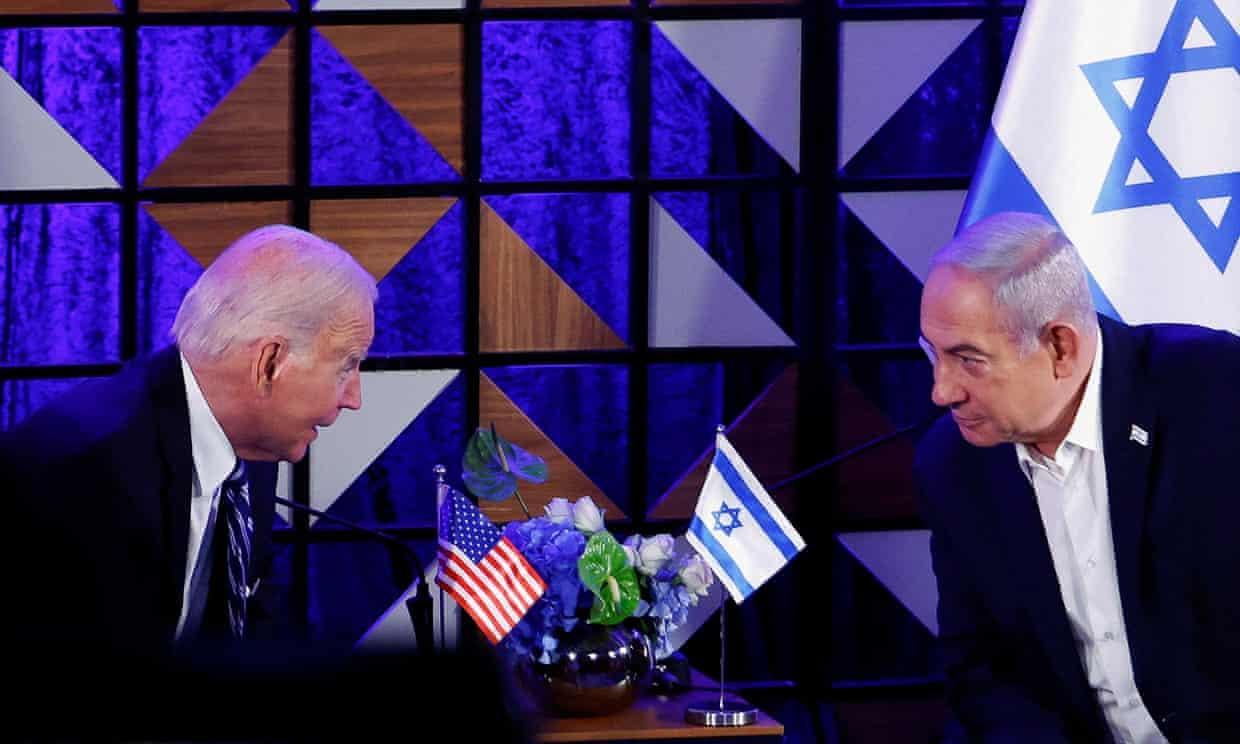Africa-Press – Mauritius. The White House’s collective stress level must have gone up several notches as Joe Biden and his entourage sat on the runway waiting to leave for the Middle East on Tuesday night.
After the violence and emotions of the past two weeks, the president’s visit was already a political gamble. But, as news came from Gaza of the bombing of the al-Ahli al-Arabi hospital, anxiety about what the visit would be able to achieve surely reached new levels.
If so, those doubts were soon confirmed. With the Gaza hospital death toll soaring, and with popular outrage coursing through the region, Arab leaders pulled out of their scheduled meeting with Biden in Amman.
By doing so, the Palestinian, Jordanian and Egyptian leaders made at least one of Biden’s key objectives – using face-to-face US presidential influence to discourage escalation – instantly more difficult.
Although Biden has duly gone ahead with his visit, landing in Tel Aviv on Wednesday to be met by Benjamin Netanyahu, it is hard to be confident as to what his presence there is able to achieve.
If the visit is a failure (an Israeli ground operation in Gaza and no humanitarian corridors out) and also a humiliation (few world leaders normally refuse a meeting with a US president) it would mark a sign of diminishing US power and influence that would be noticed in every country on Earth.
US leaders often want to show their support for Israel, of which Washington has been the indispensable ally for 75 years. Some have also travelled to the Middle East as peacemakers, starting with Henry Kissinger in the 1970s.
Even – or perhaps especially – amid the current violence, Biden may see himself in both these lights. But it is hard to think of a visit that combines such complex goals with the danger of being overtaken by fast-developing events.
That Biden is emotionally and politically committed to Israel is not open to question. His career confirms it, as do his votes when he was a senator; he has visited Israel many times, from the era of Golda Meir to the present day.
His speech in Washington last week after the Hamas murders was an exceptionally powerful moral statement of the Israel with which he identifies. But Biden also supports the Palestinians.
Last year, in Jerusalem, he drew a revealing parallel between the treatment of the Palestinians and Britain’s treatment of Irish Catholics, with whom Biden identifies.
Quoting Seamus Heaney on the “longed for tidal wave of justice”, he said the two situations were “not fundamentally unlike” one another. Again quoting Heaney, he said he hoped that the Middle East was nearing a moment where “hope and history rhyme”.
The most obvious reason for this visit is for Biden to show solidarity after the slaughter on 7 October. Showing empathy is one of Biden’s default strengths.
But he has also travelled to urge a strategically informed response by Israel, avoiding overreaction. Escalation is against the US’s interests. Washington also wants to keep open the possibility that Hamas’s hostages, some of whom are Americans, can be returned alive.
The secretary of state, Antony Blinken, seems to have had some limited success since 7 October in discouraging an overhasty response. Yet this is more easily said than done. The balance, if there is one, is devilishly difficult to get right.
The al-Ahli al-Arabi hospital bombing is a shattering reminder that civilian casualties are almost inherent in any air or ground operation in Gaza, whoever was responsible for the 500 or more deaths.
The political consequences are likely to be as miserable as they get. American fear of a wider regional conflict is real, especially with Iran-backed proxies in Lebanon across Israel’s northern borders.
Much of Blinken’s effort in the past few days has been focused on preventing such a possibility. The US has moved serious combat hardware to the eastern Mediterranean to underscore its point.
But the collapse of Biden’s Amman meeting is a serious blow to this strategy, as is the widespread regional dismissal of Israel’s denial of responsibility for the hospital attack.
A wider conflict would not merely mean further loss of life, serious though that would be. It could also mean the potential diversion of US military support from Ukraine, especially if the US Congress remains gridlocked.
War in the Middle East could thus embolden Russia in Ukraine and even encourage China over Taiwan. As earlier Middle East crises have shown, wider conflict may feed an increase in oil prices, which pushes already fragile economies into a new downturn.
Then there is the Netanyahu factor. The Israeli prime minister is now being widely portrayed as a leader on borrowed time. That’s a dangerous thought.
The events of 7 October were an unprecedented security failure on his watch. Even so, Netanyahu remains in charge. It is he whose assurances Biden must seek as long as the current crisis continues.
But the two men have little reason to trust one another and thus little reason to strike a Kissinger-type deal. In 2010 Biden, then Barack Obama’s vice-president, went to Israel to encourage the stalled two-state solution peace process.
Netanyahu promptly announced an expansion of Jewish settlements in East Jerusalem, upending Biden’s effort. Netanyahu subsequently made himself a key ally of Donald Trump, successfully urging Trump to pull out of Obama’s Iran nuclear deal and openly supporting Trump’s re-election bid.
Trump rewarded him with a symbolic “key to the White House” in a presentation case. Given that Trump could yet return in 2024, Netanyahu may think that Biden is the one on borrowed time.
All this may help to explain why, since becoming president in 2021, Biden has been reluctant to spend political capital on an Israel-Palestine dispute that once absorbed so much US presidential time and effort.
He has had other priorities on foreign policy, from China and Taiwan to Ukraine and Russia. Even in the Middle East itself, Biden has paid more attention to Saudi Arabia and Iran than to Israel-Palestine.
But it surely also reflects a wider weakness. In his recent book Grand Delusion, the former state department Middle East specialist Steven Simon charts what he calls the US’s “blundering efforts” to reshape the region over the past 40 years.
US policy may be well-meaning, Simon writes, but it too often consists of “the superimposition of grand ideas on antithetical Middle Eastern realities and American capacities”.
The current situation in the Middle East is as frightening and unstable as any in the past half-century. Until now, it was hardly surprising that Biden and his advisers had decided that re-engagement in the Israel-Palestine conflict would bring little reward.
After 7 October, it was hardly surprising that the US would try to do so nevertheless. It would be nice if hope and history could rhyme. The truth is that they do not.
“The parties are too far apart and the distance is widening,” is the bleak conclusion in Simon’s sobering book. Fifty years ago, it was often argued that the US was too strong. Today, the problem seems to be that it is too weak.
For More News And Analysis About Mauritius Follow Africa-Press







